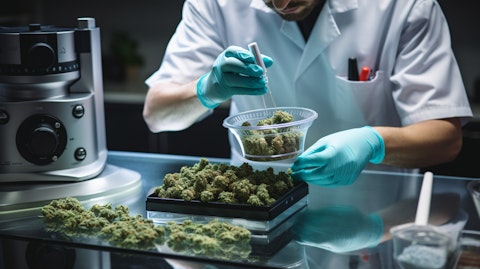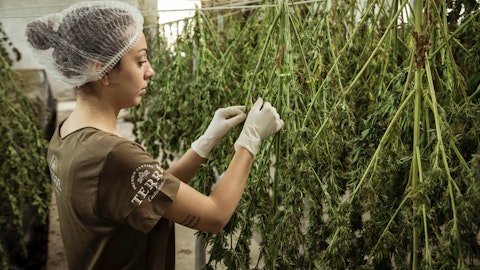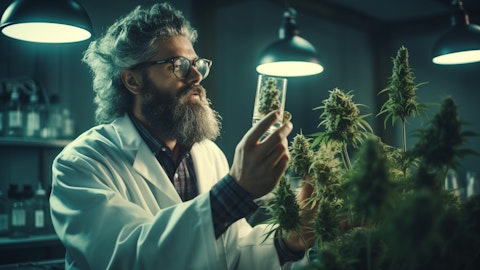OrganiGram Holdings Inc. (NASDAQ:OGI) Q1 2024 Earnings Call Transcript February 13, 2024
OrganiGram Holdings Inc. isn’t one of the 30 most popular stocks among hedge funds at the end of the third quarter (see the details here).
Operator: Good morning. My name is Krista, and I’ll be your conference operator today. At this time, I would like to welcome everyone to the Organigram Holdings First Quarter Fiscal 2024 Earnings Conference Call. [Operator Instructions] Thank you. Max Schwartz, you may begin your conference.
Max Schwartz: Good morning, and thank you for joining us today. As a reminder, this conference call is being recorded and a recording will be available on Organigram’s website 24 hours after today’s call. Listeners should be aware that today’s call will include estimates and other forward-looking information from which the company’s actual results could differ. Please review the cautionary language in our press release dated February 13, 2024, on various factors, assumptions and risks that could cause our actual results to differ. Further references will be made to certain non-IFRS measures during this call, including adjusted EBITDA, free cash flow and adjusted gross margin, among others. These measures do not have any standardized meaning under IFRS, and are intended to provide additional information and as such, should not be considered in isolation or as a substitute for measures of performance prepared in accordance with IFRS.
Our approach to calculating these measures may differ from other issuers, so these measures may not be directly comparable. Please see today’s earnings report for more information about these measures. In this call, references to fiscal 2023 are to the 13-month period from September 1, 2022 through September 30, 2023. Listeners should also be aware that the company relies on reputable third-party providers on making certain statements relating to market share data. Unless otherwise indicated, all references to market data are sourced from Hifyre in combination with data from WeedCrawler, provincial boards, retailers and our internal sales payers. Today, we’ll be hearing from key members of our senior leadership team, beginning with Beena Goldenberg, Chief Executive Officer, who will provide opening remarks and commentary, followed by Greg Guyatt, Chief Financial Officer, who will review our quarterly financial results for Q1 fiscal 2024.
Also joining us for the question-and-answer segment is Tim Emberg, Chief Commercial Officer. As a reminder to our analysts and institutional investors on the call today, we are pleased to invite you to join us at our Investor Day at our Moncton, New Brunswick facility on the evening of April 9 for dinner and the morning of April 10, where we will offer a tour of our flagship facility and showcase our science-backed product development pipeline and more. If you have not yet received an invitation or would like more information about the event, please contact me via e-mail. My e-mail address can always be found at the bottom of our press releases. I will now introduce Beena Goldenberg, Chief Executive Officer of Organigram Holdings Inc. Please go ahead, Ms. Goldenberg.
Beena Goldenberg: Thank you, Max. Good morning, everyone. Thank you for joining our call today and for your continued support of Organigram. Throughout fiscal 2023, with the dedication of our 1,000 employees across three facilities and our corporate head office, we demonstrated record-breaking international sales for the company, introduced award-winning products, completed extensive efficiency driving CapEx projects and expanded our market share in key growth categories, reaching the number 2 spot among LPs, all while maintaining our negligible debt position. We then started fiscal 2024 off on a strong footing, securing the $124.6 million strategic investment from our dedicated partner, BAT, at a premium of over 100% to Organigram share price at the time of announcement.
With this transformational deal now formally approved by shareholders and the first tranche of $41.5 million now closed, Organigram will focus on delivering on its objective of being a global cannabis leader, driven by geographic and product expansion backed by industry-leading innovation. Two-thirds of the $124.6 million investment will be used by Organigram to create a strategic investment pool named Jupiter. Jupiter will target investments in emerging cannabis opportunities internationally that will enable Organigram to apply its industry-leading capabilities in products, brands and cultivation to new markets. We have identified geographic expansion as a strategic priority, and this opportunity presents the company with the capital to lay global foundation as emerging cannabis markets continue to see significant growth.
We have seen tremendous interest from cannabis company looking for partnership opportunities and growth capital. Organigram is now uniquely positioned to take advantage of these opportunities. Organigram continues to differentiate itself as a leader with its flagship facility in Moncton, which we believe is the largest indoor cannabis facility of its kind, with over 130 microclimate, three tiered grow rooms and in-house lab testing, we could grow and test the multitude of cultivars and dial in their growing conditions without interrupting the growth cycles of our other popular strains. Our facility’s unique characteristics recently enhanced by most of our $29 million in efficiency driving CapEx projects completed last year present several other advantages.
The demand for flower in the international markets is growing as is the competition for these markets, which makes providing novel and stable cultivars a priority. Organigram has the capability to quickly trial and test unique cultivars in controlled environments, allowing us to tailor our production to address the needs of key international partners. We recently completed our first shipment to Germany, and we anticipate our first U.K. bound flower to ship out in the near term, and we are also negotiating with additional partners in other jurisdictions. Organigram’s position as a key export partner to cannabis distributors abroad is expected to be further enhanced by the EU-GMP certification at the Moncton facility, which is expected later this year, subject to the successful completion of an audit.
Organigram has also begun transitioning part of its garden to seed-based production. Seed-based production is the preferred method in mature agricultural markets as it produces more robust plants and is cheaper and faster to conduct on a large scale. We began this process in December 2023, and will provide updates on our progress in subsequent quarters. Moncton is also home to the center of excellence, the dedicated research and development facility where BAT and Organigram collaborate on product development and scientific research. In December 2023, Organigram was successful in validating molecular markers for powdery mildew resistance and validated assays related to terpene synthesis. Furthermore, pharmacokinetic studies relating to nanoemulsified ingestible formulas are now complete with results currently being compiled and analyzed.
This will allow us to quantify the onset time and peak cannabinoid levels in the blood, so we can substantiate these claims with consumers. Our R&D capabilities are beginning to more rapidly translate to technical know-how that is expected to provide Organigram with competitive advantages for years to come, spanning from more robust plants to better consumer experiences backed by science and rigorous testing protocols. Now while a Moncton facility can supply our domestic and international markets with an annual capacity of approximately 90,000 kilograms per year, our facilities in Winnipeg and Lac-Superieur are also key elements of our ongoing success. Our dedicated edibles facility in Winnipeg is capable of producing over 4 million gummies per month, supporting Organigram’s position at quarter end as the number 2 edibles producer in Canada with over 18% market share and the number 1 pure CBD edibles producer with almost two-thirds of the market share in the segment.
We are also very excited to introduce our nanoemulsion gummies to the market by the fall of 2024. Our newly expanded craft cannabis and hash facility in Lac-Superieur has now completed four craft harvest, and the facility is producing approximately 2 million units of hash annually. According to internal models, cross-referenced with figures from BDSA, Organigram is the largest legal hash producer in the world and commands over 20% of the hash market in Canada as of the end of Q1. And in keeping with our core strength of innovation, we are pleased that our first-to-market Rip-Strip Hash innovation is performing well in the market and that we have successfully grown the hash category by bringing in new users with this flavorful and easy-to-use format.
With our three facilities now fully expanded and equipped with substantial automation capabilities, Organigram is poised to more aggressively compete in the ready-to-consume product category as consumers are displaying a clear preference today for convenience and quality. In Q1 fiscal 2024, ready-to-consume products made up 46.5% of sales compared to 37% in the same period last year. In Q1 2024, Organigram produced and sold over 8 million pre-rolls. If you were to line up all these pre-rolls end to end, they would span the distance of approximately 780 kilometers. So essentially, we could light up a path from Toronto to New York City. The investments we made in our pre-roll processes in fiscal 2023 and the ensuing ramp-up have led to a 38% increase in tube style pre-roll production run rate, a 100% improvement in packaging throughput and 150% improvement in the rate that we produce are SHRED Heavies.
Our ability to consistently compete in a difficult cannabis landscape is a testament to Organigram’s unwavering dedication to its consumer and its craft. In fiscal Q1 2024, Organigram was the top three LP in all major categories, excluding vapes, and a top 5 LP in market which shares in all regions across Canada. We began the quarter in the number 2 position among LPs with a 6.7% market share and maintain this position while growing our market share to 7.3% in December. As of the end of Q1, Organigram maintained the number 2 market position among LPs for five consecutive months. And in December 2023, we had our strongest month ever with $33.5 million in retail sales, driven by consumer receptiveness to innovation in tube style pre-rolls, infused pre-rolls and gummies.

The reintroduction of JOLTS was a large contributing factor to our success in the quarter as well, with $2.9 million in ship sales in Q1. One of our key domestic areas of focus for fiscal 2024 will be to increase our share of the vapes category, which we believe will unlock market share gains. In support of this goal, Organigram has recently launched its new vaporization hardware, resulting from a strategic investment in Greentank, which is anticipated to increase flavor, performance and potency per puff while decreasing clogging a major consumer pain point. Looking at our earnings for the quarter, which Greg will expand on shortly, we are pleased to deliver adjusted gross margins, which returned to our previously reported levels. We also delivered positive adjusted EBITDA and cash flow from operations of $7.7 million.
Contributing to these improvements were our growth in the pre-roll category and the reintroduction of Edison JOLTS to the market. As we focus on driving domestic and international market share gains through continued innovation and expansion into vapes, refining our product and geographic mix and reaping the benefits from increased automation at our facilities, we expect our margins to demonstrate more stability in fiscal ’24 compared to fiscal ’23. On a year-over-year basis, we expect both revenue and incremental margin growth. I will now hand the call over to Greg to review our financial performance for the quarter.
Greg Guyatt: Thank you, Beena. It’s a pleasure to be here today as a new member of the Organigram team. I’ve been involved in the cannabis industry for many years now, and I’ve watched Organigram growth leadership position in Canada. So I am very pleased to join this incredibly focused and disciplined team and particularly pleased to join at such a pivotal time in the company’s evolution. As Beena mentioned, we started off the quarter achieving positive adjusted EBITDA and positive cash flow from operations, demonstrating our investments in automation and our commitment to long-term efficiencies that are beginning to pay off. Q1 fiscal 2024 growth and net revenue decreased by 8% and 16%, respectively, primarily due to net decreases in international revenue of $4.8 million and medical sales of $1 million when compared to Q1 fiscal 2023.
Organigram’s cost of sales in Q1 fiscal 2024 was $27.3 million compared to $31.6 million in Q1 fiscal 2023, representing a decrease of 14%. The decrease in cost of sales over the same prior year period was primarily due to lower medical and international sales and lower cultivation and post-harvest costs. Included in Q1 fiscal 2024 cost of sales were $1.7 million of inventory provisions that primarily related to net realizable value adjustments of inventories. We harvested approximately 20,000 kilograms of flower during Q1 fiscal 2024 compared to about 22,000 kilograms in Q1 fiscal 2023, which represents a decrease of 11%. The decrease was primarily attributable to changes in our cultivar mix to address changing consumer preferences. While yields and THC content will fluctuate over time, the trend we have seen over the last two years has been larger yields and higher potencies.
In Q1, Organigram experienced a 53% increase in flower produced containing more than 24% THC. Anticipated higher yields should reduce the cost of cultivation in the long run. As this flower is sold, we expect to achieve a higher gross margin rate. In Q1 fiscal 2024, adjusted gross margin increased to 31% or $11.2 million, up from 30% or $12.8 million in Q1 fiscal 2023. The increase in the adjusted gross margin rate was primarily due to lower cultivation and post-harvest costs, lower depreciation expense and resumed sales of Edison JOLTS, partially offset by lower international sales. As Beena mentioned, in comparison to Q4 of fiscal 2024, where adjusted gross margin was 17%, we achieved a marked improvement in adjusted gross margin in Q1. In Q1, SG&A increased to $16.7 million compared to $15.7 million in Q1 fiscal 2023 or an increase of 7%.
The increase in expenses mainly relates to foreign exchange losses on foreign currency denominated receivables as the Canadian dollar weakened during Q1 fiscal 2023 and strengthened in Q1 fiscal 2024 and higher professional fees primarily related to Project Jupiter. These were partially offset by lower depreciation resulting from impairment charges recorded in fiscal year 2023. We are pleased to report that in the quarter, we returned to positive adjusted EBITDA of $136,000 compared to Q4 fiscal 2023’s adjusted EBITDA of negative $2.4 million, representing an increase of $2.5 million. We anticipate adjusted EBITDA to exceed fiscal 2023’s adjusted EBITDA. Net loss for Q1 fiscal 2024 was $15.8 million compared to net income of $5.3 million in the same prior period.
The increase in net loss from the comparative period is primarily due to a lower gross margin resulting from a reduction in the gain on fair value of biological assets. From a statement of cash flow perspective, net cash provided by operating activities was $7.7 million in Q1 fiscal 2024 compared to $3.5 million in the prior year period. The increase in cash provided by operating activities was primarily due to a return to historical working capital levels after a planned reduction in accounts payable in advance of our ERP go-live. Cash provided by investing activities in Q1 was $0.4 million compared to cash used of $1.7 million in Q1 fiscal 2023. The increase compared to the prior year period was primarily due to higher purchases of property, plant and equipment of $8.4 million in Q1 fiscal 2023, partially offset by proceeds from the net redemption of short-term investments of $5.1 million.
We are pleased to state that we have one of the healthiest balance sheets in the space. As of December 31, 2023, we had a total cash position of $54.6 million, including both restricted and unrestricted cash. This does not include the $41.5 million we received from BAT in January. By way of reminder, half of the $41.5 million tranche will be allocated to Organigram operating cash in Q2 fiscal 2024, while the other half will be allocated to Project Jupiter. Overall, we are pleased with our results for the quarter, which saw Organigram once again deliver positive adjusted EBITDA and improved adjusted gross margins. While the company expects to continue to report growth in year-over-year adjusted EBITDA, periods when the company achieved significant increases to sales may result in increases to receivables, which could negatively impact cash from operating activities.
This concludes my comments. I will now turn the call back to Beena.
Beena Goldenberg: Thank you, Greg. As has been the case historically, Organigram will continue to drive growth and shareholder value through an industry-leading focus on innovation and the integration of new technologies that provide sustainable competitive advantages for the company and differentiated experiences for consumers at home and abroad. We also continue to leverage our leadership position in the industry to advocate for much-needed reform in the sector that will not only level the playing field for all companies, but also support the development and growth of a sustainable industry in the long term. We believe that the cannabis industry in Canada has begun to reach an inflection point that will remove supplies in the market and accelerate consolidation.
Companies engaging in THC inflation who have dubiously enjoyed temporary competitive advantages to artificially inflating their labeled THC content are facing more pressure as Health Canada and the OCS have announced random THC testing protocols. We have also seen the CRA begin to garnish companies who are in arrears on their excise taxes and many companies are already stretching their payables to preserve cash. As capital markets have dried up and increased enforcement removes unfair advantages and penalizes those who don’t contribute to the health of our sector, the Canadian market will experience a shakeout. As this materializes, Organigram stands to cement itself as a long-term industry leader, owing to its strong balance sheet, increasing production efficiency, industry-leading R&D and reinvigorated focus on international expansion supported by Project Jupiter.
Once again, we thank you for joining us today, and for your continued support of Organigram during a very exciting time for the company. We look forward to seeing as many of you as possible at our Investor Day in April, and should you have any questions, please feel free to contact Max. Thank you, and I will now open the call for questions.
Operator: [Operator Instructions] Your first question comes from the line of Aaron Grey from Alliance Global Partners. Please go ahead. Your line is open.
See also 15 Most Unfriendly Countries in Asia and 15 Worst Airports in the U.S. for Connecting Flights.
Q&A Session
Follow Organigram Holdings Inc. (NASDAQ:OGI)
Follow Organigram Holdings Inc. (NASDAQ:OGI)
Receive real-time insider trading and news alerts
Aaron Grey: Hi, good morning, and thank you very much for the questions. Nice to see the gross margin improvement during the quarter along with some of the other achievements you had. Quickly, on the gross margin, right, so a nice uptick in the quarter. You talked about some of the levers that participated to that. So, when you think about lower post-harvest costs, depreciation, along with some of the mix with JOLTS, what would have been the biggest contributor sequentially? It looks like, if you back into some of the P&L, might have been depreciation, which could offer further color that would be greatly appreciated. And then on the go forward, how do we think about mix contributing to the margin, particularly as we think about vapes? Historically, it’s been one of the more, tougher formats to be profitable in. So, if you could offer any comments of how you’re thinking about margin and mix as you look to increase your share in vape? Thanks.
Beena Goldenberg: Perfect. Thank you, Aaron, for the question. I’ll pass the first part of the question over to Greg to talk about the gross margin, and then I’ll take on the mix part of the question. So, go ahead, Greg.
Greg Guyatt: Sure. Thanks, Beena. Well first of all, we believe we’ve set ourselves up to drive higher margins throughout 2024 and beyond. And really, as you mentioned, it’s increasing production efficiencies from continuing, to dial in our automated processes, such as around our pre-roll production. And we’re going to see expected – eventual savings and higher yields related to the seed-based transition as well. We’re also going to see contribution from flower Laurentian ultimately as well. And on the international side, it’s really going to be driven by EU GMP, which will help improve our margins on that front. Also contributing, we’ll have some new innovation, as we mentioned before, around the nano emulsion and further expansion into vapes. So, as I said, I think those factors will continue to drive margin improvements, as we get through the rest of the year. Beena?
Beena Goldenberg: Okay. Great. Thanks Greg. And just building on what Greg said. So when outbound of the mix and while vapes has been a competitive market in the past. For us, vapes is a big opportunity for improved mix, because we’re competing in the flowers that has fullness of margins. And so this is a great opportunity for us and totally incremental. We’re not cannibalize an existing business. We come in with products that is differentiated with our Green Tank investment being in the vaporization technology. So we’re very excited about what that could contribute, but just as I mentioned in the script, at the end of the day, our ready-to-consume products are growing, and that’s what’s driving the growth in the category versus just flower, right?
It’s all about convenience as consumers are looking for it. So as we convert from flower to pre-roll, as we convert people from pre-rolls to vapes and to gummies to some of the derivatives, that’s the mix that’s going to improve our domestic recreational business. And then, obviously, the impact of international sales. We had a low international sales in this quarter, and we expect to have growing international sales as we look out, especially as a result of adding the EU GMP benefit that we expect to have sometime this summer. So, at the end of the day, that’s what’s going to drive our improved mix. We’re still very proud of our flower category, but the category overall industry is changing, and ready-to-consume, is becoming a bigger part of it, and we’re participating in both gummies, infused pre-rolls, and pre-rolls in a big way.
Aaron Grey: Thank you. Really appreciate that, color from both you, Greg, and Beena. Second question for me. You know, often in this, we’ve talked about the need for a shakeout. Beena, you talked about in your prepared remarks, one of the issues that you had called out a few quarters ago as being a greater need in terms of THC inflation, and now there’s some THC testing protocols that you mentioned, unpaid taxes or something that we’ve known about in the industry, and you also called out how those might be being cut down as well. And basically, it seemed that you might have a – you had somewhat of a different tone in terms of that shakeout maybe being more on the doorstep than maybe we had seen in the past. So, just any more color you can offer in terms of what you might be seeing, incrementally?
You mentioned the prepared remarks to why you might see more of a shakeout in the industry in 2024 than what we might have expected to see in past years but didn’t quite come to fruition? Thank you.
Beena Goldenberg: Yes, no problem. So, absolutely, we were a big, we talked a lot about THC inflation, and I’m not sure we’ve seen the full impact of the benefits of both the OCS random testing and Health Canada testing, because we still see, you know, THC inflation is alive and well out in the market. We actually see that flower – over 25% THC has been up versus last year. It now represents 77% of all flower sales, where a year ago it was up 42%. So, it was 42% of the flowers. So, we are seeing continued higher THC, and we are still seeing random testing showing that there are several players out there, continuing to identify their THC flower as higher potency than it really is. But we expect this is going to somehow start to stop as testing continues.
And the boards are challenging. We’ve heard anecdotally some boards are pushing back on over 30% flower and asking for secondary testing. So, that is going to take time to kind of happen through the industry, but we’re excited to see that it’s starting to be addressed. But why do I think the consolidation, or the shake-up is going to happen? And I think it’s in the next 12 months. And that’s because we’ve been watching very carefully the cash of different companies, when the debt is due, that how people are stretching their payables. And what was giving some of these players in the industry more runway was the ability to not pay their excess taxes. This really wasn’t a fair playing field. You know, a company like Organogram pays our excise taxes on time.




